外研版高中必修二Module4 -Fine Arts – Western, Chinese and Pop Arts --Language Points(共52页)
文档属性
| 名称 | 外研版高中必修二Module4 -Fine Arts – Western, Chinese and Pop Arts --Language Points(共52页) | 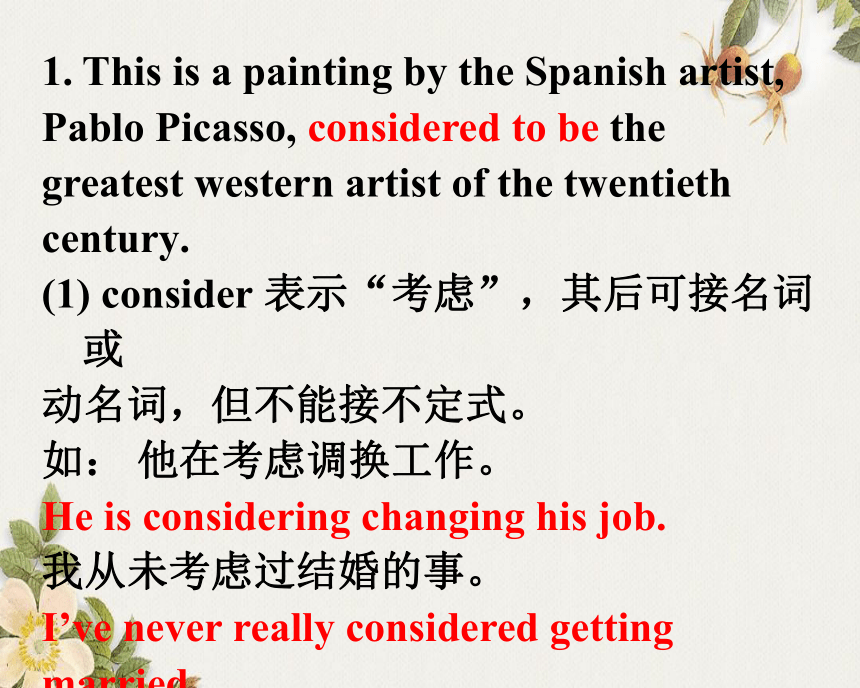 | |
| 格式 | zip | ||
| 文件大小 | 1.0MB | ||
| 资源类型 | 教案 | ||
| 版本资源 | 外研版 | ||
| 科目 | 英语 | ||
| 更新时间 | 2021-07-14 20:30:54 | ||
图片预览


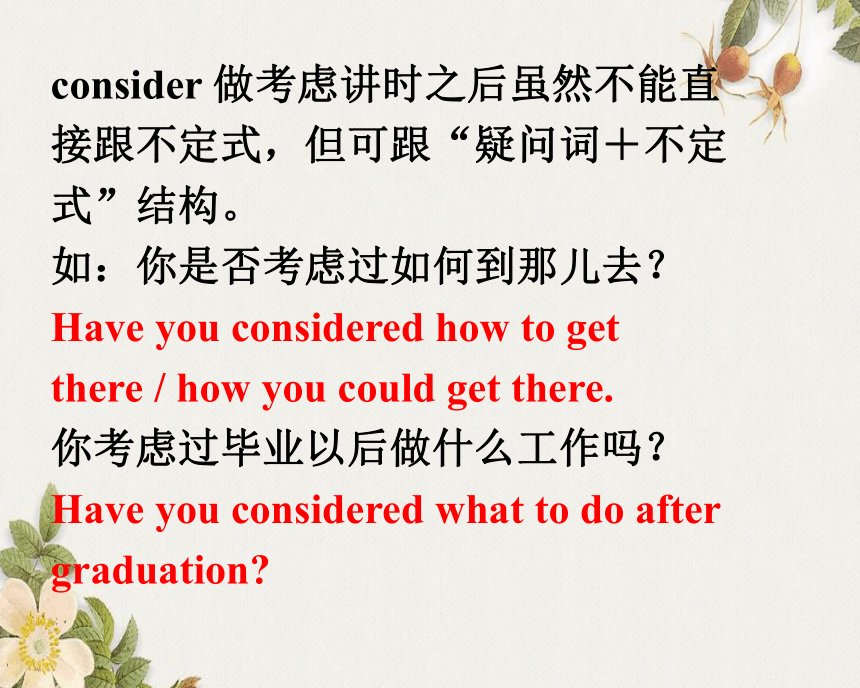
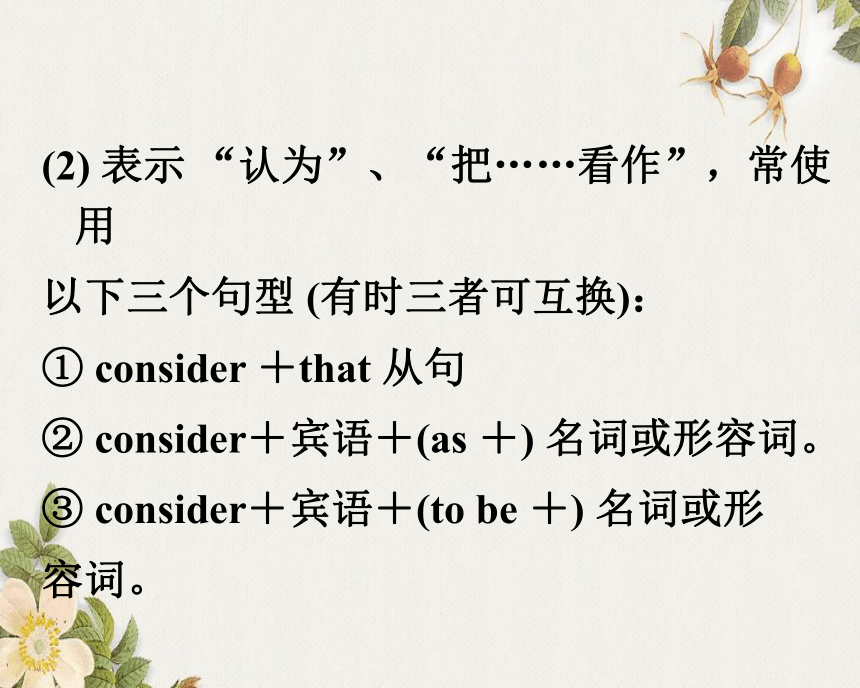

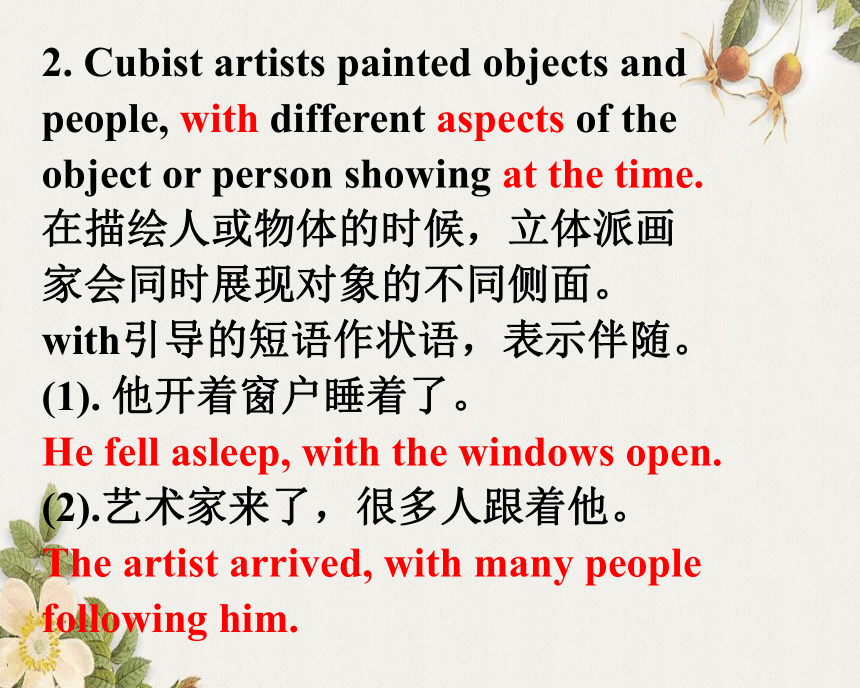

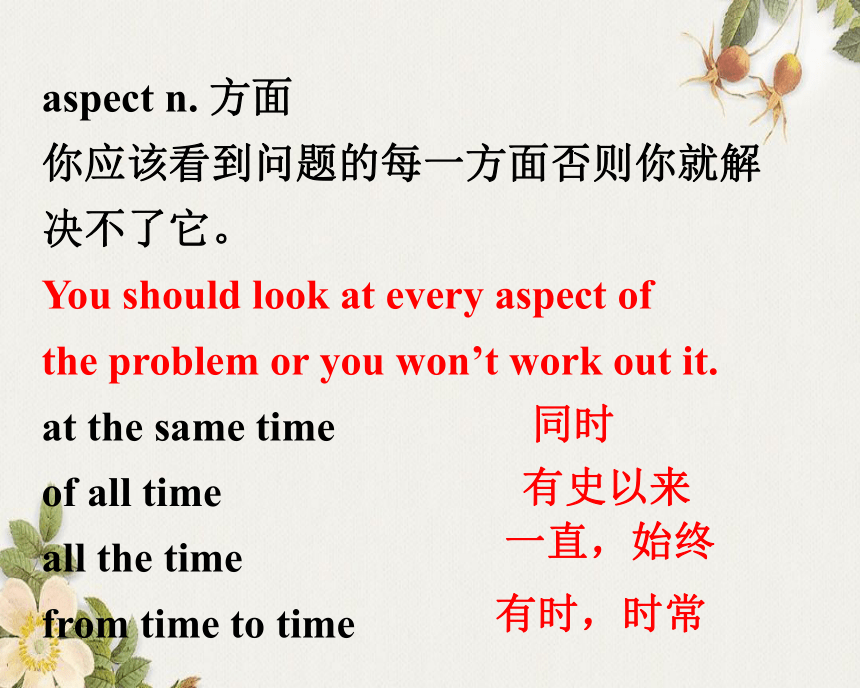
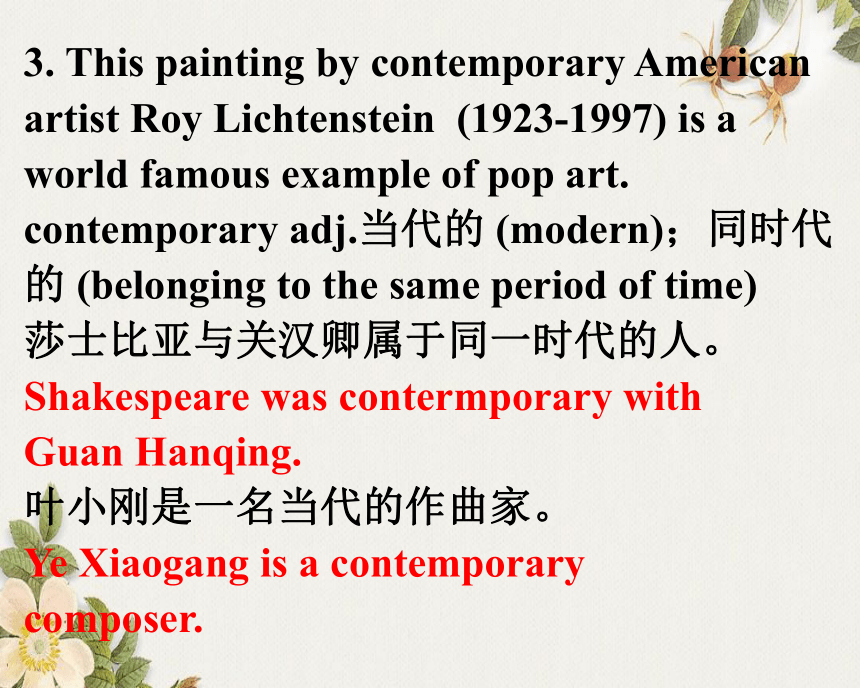
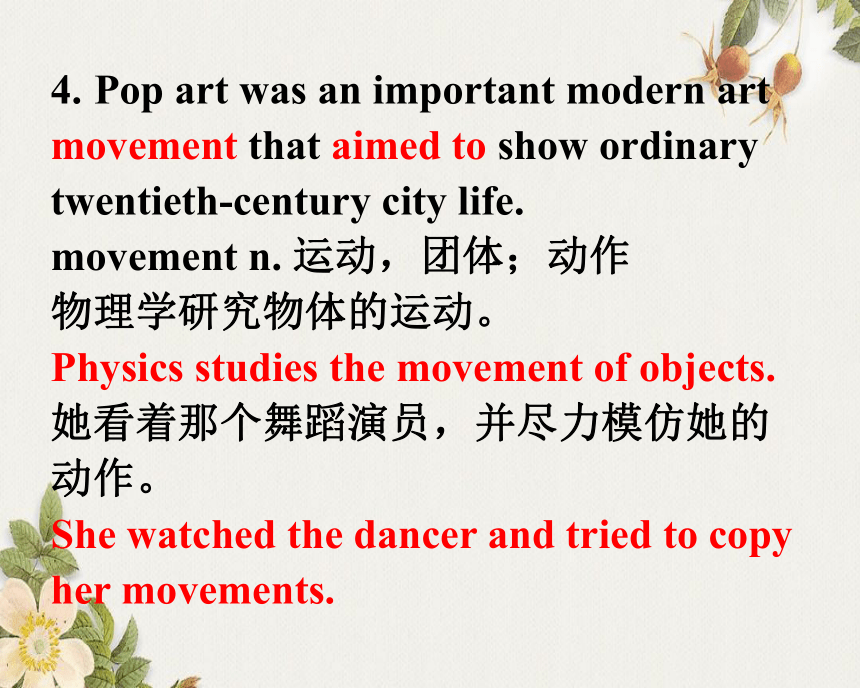
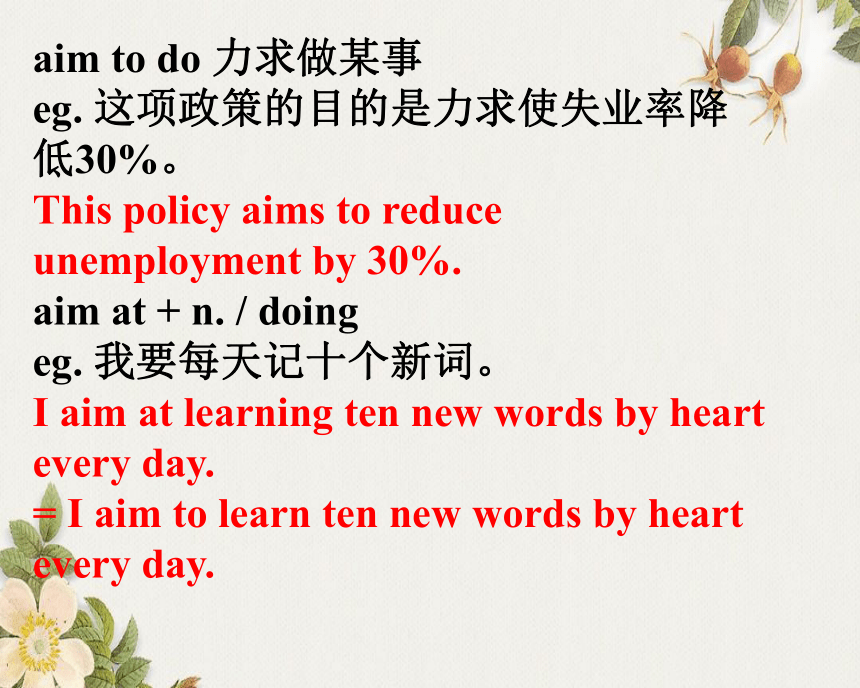

文档简介
(共52张PPT)
This
is
a
painting
by
the
Spanish
artist,
Pablo
Picasso,
considered
to
be
the
greatest
western
artist
of
the
twentieth
century.
consider?表示“考虑”,其后可接名词或
动名词,但不能接不定式。
如:
他在考虑调换工作。
He
is
considering
changing
his
job.
我从未考虑过结婚的事。
I’ve
never
really
considered
getting
married.
我会认真的考虑你的建议的。
I
will
consider
your
plan
seriously.
我们学校很多学生在考虑去国外学习。
Many
students
in
our
school
are
considering
studying
abroad.
我们考虑到哪儿去弄足够的水。
We
considered
where
to
get
enough
water.
consider
做考虑讲时之后虽然不能直
接跟不定式,但可跟“疑问词+不定
式”结构。
如:你是否考虑过如何到那儿去?
Have
you
considered
how
to
get
there
/
how
you
could
get
there.
你考虑过毕业以后做什么工作吗?
Have
you
considered
what
to
do
after
graduation?
(2)
表示
“认为”、“把……看作”,常使用
以下三个句型
(有时三者可互换):
①
consider
+that
从句
②
consider+宾语+(as
+)
名词或形容词。
③
consider+宾语+(to
be
+)
名词或形
容词。
我认为他是一个诚实的人。
I
consider
him
(as)
honest
(或an
honest
man).
I
consider
him
(to
be)
honest
(或an
honest
man).
I
consider
that
he
is
honest
(或an
honest
man).
2.
Cubist
artists
painted
objects
and
people,
with
different
aspects
of
the
object
or
person
showing
at
the
time.
在描绘人或物体的时候,立体派画
家会同时展现对象的不同侧面。
with引导的短语作状语,表示伴随。
(1).
他开着窗户睡着了。
He
fell
asleep,
with
the
windows
open.
(2).艺术家来了,很多人跟着他。
The
artist
arrived,
with
many
people
following
him.
(3).
我们关上门整整学习了一下午。
We
studied
with
the
door
closed
all
the
afternoon.
(4).
我没做完作业就回家了。
He
went
home
with
his
homework
unfinished.
(5).
老师进来了,手里拿着一本书。
The
teacher
came
in
with
a
book
in
her
hand.
aspect
n.
方面
你应该看到问题的每一方面否则你就解决不了它。
You
should
look
at
every
aspect
of
the
problem
or
you
won’t
work
out
it.
at
the
same
time
of
all
time
all
the
time
from
time
to
time
同时
有史以来
一直,始终
有时,时常
3.
This
painting
by
contemporary
American
artist
Roy
Lichtenstein
(1923-1997)
is
a
world
famous
example
of
pop
art.
contemporary
adj.当代的
(modern);同时代
的
(belonging
to
the
same
period
of
time)
莎士比亚与关汉卿属于同一时代的人。
Shakespeare
was
contermporary
with
Guan
Hanqing.
叶小刚是一名当代的作曲家。
Ye
Xiaogang
is
a
contemporary
composer.
4.
Pop
art
was
an
important
modern
art
movement
that
aimed
to
show
ordinary
twentieth-century
city
life.
movement
n.
运动,团体;动作
物理学研究物体的运动。
Physics
studies
the
movement
of
objects.
她看着那个舞蹈演员,并尽力模仿她的
动作。
She
watched
the
dancer
and
tried
to
copy
her
movements.
aim
to
do
力求做某事
eg.
这项政策的目的是力求使失业率降
低30%。
This
policy
aims
to
reduce
unemployment
by
30%.
aim
at
+
n.
/
doing
eg.
我要每天记十个新词。
I
aim
at
learning
ten
new
words
by
heart
every
day.
=
I
aim
to
learn
ten
new
words
by
heart
every
day.
他用枪瞄准了敌军军官。
He
aimed
the
gun
at
the
enemy
officer.
我立志成为一名律师。
I
aim
to
be
a
lawyer.
他立志游一公里。
He
aimed
to
swim
a
mile.
你的生活目标是什么?
What
is
your
aim
in
life?
5.
For
example,
it
shows
things
such
as
soup
cans
and
advertisements.
for
example
&
such
as
&
that
is
for
example
一般只举同类人或物中的一个为例,作插入语,可位于句首、句中或句末。
假如你遇到了野生动物你会怎么做呢?-里人狮子。
What
would
you
do
if
you
met
a
wild
animal
——
a
lion,
for
example?
such
as一般列举同类人或事物中的几个例子,不全列举。直接跟宾语,后面不可有逗号,不宜与and
so
on连用。
她有许多兴趣爱好,例如唱歌、跳舞、集邮。
She
has
many
hobbies,
such
as
singing,
dancing
and
collecting
stamps.
that
is
也就是说,
即。是对前者的解释说明。
我们一周以后和你见面,即3月1日。
We’ll
meet
you
in
a
week,
that
is,
on
March
1.
6.
Qi
Baishi
(1863-1957),
one
of
China’s
greatest
painters,
followed
the
traditional
Chinese
style
of
painting.
follow
v.
遵循,跟随
following
adj.
下列
的,其次的
村民们依然遵循着老一辈的习俗。
The
villagers
still
followed
the
customs
of
their
grandfathers.
孩子们跟着他们的母亲来到了屋子里。
The
children
followed
their
mother
into
the
room.
第二天医生发现病死了。
The
following
day,
the
doctor
found
the
patient
dead.
下面的学生们请跟我来。
The
following
students
please
come
with
me.
7.
Qi
baishi
observed
the
world
of
nature
very
carefully,
and
his
paintings
are
special
because
of
this.
observe
v.
看到;注意
这位科学家看到了一颗新星。
The
scientist
observed
a
new
star.
据观察40%的病人患有高血压。
It
was
observed
that
40%
of
the
patients
had
high
blood
pressure.
警察看到他在以每小时九十里的速
度开车。
The
police
observed
him
driving
at
90
miles
per
hour.
观察学生们如何在课上睡觉很有趣。
It
is
interesting
to
observe
how
students
sleep
in
class.
8.
Instead,
a
picture
should
try
to
show
the
“life”
of
its
subject.
相反,一幅画应该努力表现对象的生命。
Instead
adv.
意思是“代替,反而,而”。
放在句子用逗号隔开;或放在句子后面。
Eg:
他累了,让我代替他去吧。
He
is
tired,
and
let
me
go
instead.
她从不学习,相反,她整天玩耍。
She
never
studies.
Instead,
she
plays
all
day.
拓展
Instead
of
取代,而不……
Eg:
我打算去新西兰而不是日本。
I
will
go
to
New
Zealand
instead
of
Japan.
我们打算在花园而不在餐厅吃早饭。
We
intended
to
have
our
breakfast
in
the
garden
instead
of
in
the
dinning
room.
注意:Instead
of
与
instead
的相互
转换
例如:我们要去青岛而不是大连度
假。
We’ll
go
to
Qingdao
instead
of
Dalian
for
a
holiday.
We’ll
not
go
to
Dalian.
Instead,
we’ll
go
to
Qingdao
for
a
holiday.
9.
He
is
most
famous
for
his
lively
painting
of
horses.
“most
+
形容词或副词”
结构前不用冠词,
或有不定冠词a时,
不表示最高级,
而表示
“非常,很”,
相当于
very。
那位女士在照顾小孩方面很有经验。
The
lady
is
most
experienced
in
taking
care
of
children.
这真是一个非常有趣的故事。
This
is
really
a
most
interesting
story.
lively
有“活泼的、快活的、生动
的”等意思,可以指人或物,可作
定语或表语。
他讲了一个生动的故事。
He
told
a
lively
story.
alive、live、living
辨析
三者都有都有“活的、有生命的”意思,与dead意义相反。但
live通常只作前置定语,且一般用于动物;alive、living不仅可作定语(alive只能放在它所修饰的名词后;living
既可以置于名词前,也可置于名词后),也可以作表语。
这是一条活鱼。
This
is
a
live
(=living)
fish.
=This
is
a
fish
alive.
注:指动物,且作定语时,三者均可用)
谁是当今最伟大的人物?
Who’s
the
greatest
man
alive
(=living
man)?
那条鱼还活着。
The
fish
is
still
alive
(=living)
注:指动物作表语时不能用live。
10.
I’m
studying
art
at
school,
and
I
enjoy
it
a
lot,
although
I
can
get
tired
of
looking
at
pictures
all
the
time.
get/
be
tired
of
对……感到厌倦
get/
be
tired
from
因……而疲倦、疲劳
eg:
(1)
—Why
did
you
close
the
door?
—I’m
tired
________
to
the
baby
crying.
A.
to
listen????????????????
B.
of
listen??
C.
of
listening?
???????????
D.
listen
C
(2)
“Do
you
like
working
as
a
waiter?”
“Yes,
but
I
get
tired
________
the
whole
day.”
A.
standing?
???????????????
B.
from
standing?
C.
to
stand?
???????????????
D.
of
the
standing
B
11.
But
I
can’t
stand
that
picture
of
a
golden-haired
girl.
stand
做忍受讲时常用于否定和疑问句其
后跟名词或动名词。
eg.我再也无法忍受这项工作了,它让人
感到厌烦。
I
can’t
stand
the
job
any
more,
it’s
boring.
你能忍受反复的做同样的工作吗?
Can
you
stand
doing
the
same
job
again
and
again?
12.
My
parents
are
fond
of
going
to
art
galleries
and
often
take
me
with
them,
so
I’ve
developed
an
interest
in
art.
我的父母很喜欢去美术馆,
常带我一起去,
我由此对艺术产生的了兴趣。
(1)
be
fond
of
doing
sth/sth
喜欢
我们都很喜欢她.
we
are
all
very
fond
of
her.
这个孩子喜欢弹钢琴。
The
child
is
fond
of
playing
the
piano.
(2)
develop
an
interest
in
doing
sth/sth
…对……产生兴趣
她已经对集邮感兴趣。
She
has
developed
an
interest
in
collecting
stamps.
Go
to+
an
activity
参加某种活动。后接不同的名词,汉语译法不同。
如:他昨天参加了一个重要的会议。
He
went
to
an
important
meeting
yesterday.
我们明天将去参观一个展览。
We
are
going
to
an
exhibition
tomorrow.
你愿意和我一起去听音乐会吗?
Would
you
like
to
go
to
the
concert
with
me?
13.
So
I’ve
developed
an
interest
in
art.
interest
vt.
使……感兴趣
sth
interest
sb
这本书使我很感兴趣。
This
book
interests
me
very
much.
=
I’m
interested
in
the
book
very
much
sb
be
interested
in
sth
n.
兴趣,爱好
他对政治极感兴趣。
He
has
a
great
interest
in
politics.
a
broad
interest
广泛兴趣
a
strong
interest
极强的兴趣
adj.
interesting
令人感兴趣的(事物);
interested
(某人对某事)有兴趣的
interest
sb
in
sth
使某人注意,关心或参
入某事;使某人对某事感兴趣
sb
have
an
interest
in
sth.
/
in
doing
sth.
对某方面有兴趣
(关心)
常见短语:
hold
one’s
interest
吸引住某人的兴趣
lose
interest
in
对……不再感兴趣
show
/
take
(an)
interest
in
/
in
doing
sth.
对……表示关心(有兴趣)
sb
do
sth
with
interest
津津有味地
lose
interest
in
sth.
/
in
doing
sth.
对某方
面失去兴趣
14.
I
can
tell
by
the
style.
tell
做分辨、辨别讲。及物或不及物动词
tell
the
difference
between
A
and
B
=tell
A
from
B
=tell
A
and
B
apart
eg:
你能分得清Tom和他的双胞胎兄弟吗?
Can
you
tell
the
difference
between
Tom
and
his
twin
brother?
Can
you
tell
Tom
from
his
twin
brother?
Can
you
tell
Tom
and
his
twin
brother
apart?
15.
I
think
he’s
an
extraordinary
artist.
我认为他是一个了不起的艺术家。
extraordinary
adj.
不平常的,格外的,特
别的。
他才华出众。
His
talents
are
quite
extraordinary.
特别全会
an
extraordinary
general
meeting.
Practice
1.
我从叔叔那了收到了一份非常特别的礼物。
I
received
a
most
unusual
gift
from
my
uncle.
2.他能在五分钟内画出一只栩栩如生的猫。
He
can
draw
a
lively
cat
in
five
minutes.
Translation
3.
我讨厌听他的演讲。
I’m
tired
of
his
speech.
4.
他无法忍受没有因特网的生活。
He
can’t
stand
life
without
the
Internet.
Correct
the
following
sentences
1.
He
considered
to
study
further
in
Beijing
University.
2.
Latin
is
not
an
alive
language.
3.
He
is
crazy
on
the
football
matches.
4.
They
are
fond
about
collecting
stamps.
5.
It
was
so
dark
that
I
couldn’t
see
it
was
you.
6.
I
was
tired
of
having
stayed
up
all
night.
studying
a
living
about
of
tell
from/with
We
all
consider
Mr.
Liu
_____
an
excellent
teacher
in
our
school.
Which
of
the
following
is
wrong?
A.
/
B.
to
be
C.
as
D.
for
2.
Tom
said
he
was
considering
__
his
job.
A.
changing
B.
to
change
C.
of
changing
D.
being
changed
D
A
Choose
the
best
answers
3.
People
found
him
still
__
after
the
road
accident,
so
they
sent
him
to
hospital
at
once.
alive
B.
living
C.
to
live
D.
lively
4.
The
moment
that
they
had
been
looking
forward
__
finally.
A.
to
come
B.
to
coming
C.
to
have
come
D.
to
came
A
D
5.What
you
said
must
agree
__
what
you
did,
only
in
this
can
you
make
people
trust
you.
A.
to
B.
on
C.
with
D.
in
6.The
boy’s
pale
face
suggests
that
he
__
badly
ill.
A.
should
be
B.
be
C.
is
D.
has
been
C
C
7.
We
must
aim
___
increase
productions.
A.
to
B.
for
C.
at
D.
on
8.
She
is
never
tired
__
talking
about
her
clever
son.
/
B.
from
C.
of
D.
out
9.
--Do
you
think
the
Stars
will
beat
the
Bulls?
--Yes,
they
have
better
player,
so
I
__
them
to
win.
A.
hope
B.
prefer
C.
expect
D.
want
A
C
C
10.
We
are
all
__
people.
common
B.
ordinary
C.
usual
D.
normally
11.They
have
nothing
in
__
each
other.
common
with
B.
common
to
C.
ordinary
D.usual
to
12.
The
teacher
are
busy
__
the
exam
papers
while
the
students
are
busy
__
the
exam.
prepare;
prepare
for
preparing;
preparing
for
prepare
for;
prepare
preparing
for;
preparing
B
A
B
13.
She
treated
me
__
a
child
and
treated
me
__
a
movie.
for;
for
B.
to;
to
C.
as;
for
D.
as;
to
14.
Zhou
Enlai
is
highly
thought
__
by
the
Chinese
people.
/
B.
of
C.as
D.
to
be
15.--I
can’t
get
my
car
__
on
cold
morning.
--Have
you
tried
__
the
tank
with
hot
water?
A.
started;
to
fill
B.
to
start;
filling
C.
starting;
to
fill
D.
start;
filling
D
B
B
16.
I’m
considering
__
a
Bluebird,
for
these
days
the
prices
of
cars
are
going
down.
A.
to
buy
B.
buying
C.
to
sell
D.
selling
17.
Most
people
__
Mr
White
their
best
friend.
A.
consider
B.
think
of
C.
regard
D.
treat
18.
__
his
great
works,
the
writer
is
respected
everywhere.
A.
Knowing
for
B.
Knowing
to
C.
Known
as
D.
Known
for
B
A
D
19.
It
is
always
difficult
being
in
a
foreign
country,
__
if
you
don’t
speak
the
language
there.
extremely
B.
naturally
C.
basically
D.
especially
20.
There
was
little
time
left,
but
he
__
to
get
to
the
scene
and
covered
the
accident.
managed
B.
tried
C.
succeeded
D.
attempted
D
A
21.
I
suggest
__
out
for
a
walk.
A.
to
go
B.
for
going
C.
going
D.
go
22.
I
suggest
that
he
__
up
smoking.
A.
give
B.
gives
C.
will
give
D.
gave
23.The
students
__
Mr.
Yang
__
best
in
teaching.
A.
consider;
as
B.
consider;
being
C.
consider;
/
D.
considering;to
be
C
A
C
This
is
a
painting
by
the
Spanish
artist,
Pablo
Picasso,
considered
to
be
the
greatest
western
artist
of
the
twentieth
century.
consider?表示“考虑”,其后可接名词或
动名词,但不能接不定式。
如:
他在考虑调换工作。
He
is
considering
changing
his
job.
我从未考虑过结婚的事。
I’ve
never
really
considered
getting
married.
我会认真的考虑你的建议的。
I
will
consider
your
plan
seriously.
我们学校很多学生在考虑去国外学习。
Many
students
in
our
school
are
considering
studying
abroad.
我们考虑到哪儿去弄足够的水。
We
considered
where
to
get
enough
water.
consider
做考虑讲时之后虽然不能直
接跟不定式,但可跟“疑问词+不定
式”结构。
如:你是否考虑过如何到那儿去?
Have
you
considered
how
to
get
there
/
how
you
could
get
there.
你考虑过毕业以后做什么工作吗?
Have
you
considered
what
to
do
after
graduation?
(2)
表示
“认为”、“把……看作”,常使用
以下三个句型
(有时三者可互换):
①
consider
+that
从句
②
consider+宾语+(as
+)
名词或形容词。
③
consider+宾语+(to
be
+)
名词或形
容词。
我认为他是一个诚实的人。
I
consider
him
(as)
honest
(或an
honest
man).
I
consider
him
(to
be)
honest
(或an
honest
man).
I
consider
that
he
is
honest
(或an
honest
man).
2.
Cubist
artists
painted
objects
and
people,
with
different
aspects
of
the
object
or
person
showing
at
the
time.
在描绘人或物体的时候,立体派画
家会同时展现对象的不同侧面。
with引导的短语作状语,表示伴随。
(1).
他开着窗户睡着了。
He
fell
asleep,
with
the
windows
open.
(2).艺术家来了,很多人跟着他。
The
artist
arrived,
with
many
people
following
him.
(3).
我们关上门整整学习了一下午。
We
studied
with
the
door
closed
all
the
afternoon.
(4).
我没做完作业就回家了。
He
went
home
with
his
homework
unfinished.
(5).
老师进来了,手里拿着一本书。
The
teacher
came
in
with
a
book
in
her
hand.
aspect
n.
方面
你应该看到问题的每一方面否则你就解决不了它。
You
should
look
at
every
aspect
of
the
problem
or
you
won’t
work
out
it.
at
the
same
time
of
all
time
all
the
time
from
time
to
time
同时
有史以来
一直,始终
有时,时常
3.
This
painting
by
contemporary
American
artist
Roy
Lichtenstein
(1923-1997)
is
a
world
famous
example
of
pop
art.
contemporary
adj.当代的
(modern);同时代
的
(belonging
to
the
same
period
of
time)
莎士比亚与关汉卿属于同一时代的人。
Shakespeare
was
contermporary
with
Guan
Hanqing.
叶小刚是一名当代的作曲家。
Ye
Xiaogang
is
a
contemporary
composer.
4.
Pop
art
was
an
important
modern
art
movement
that
aimed
to
show
ordinary
twentieth-century
city
life.
movement
n.
运动,团体;动作
物理学研究物体的运动。
Physics
studies
the
movement
of
objects.
她看着那个舞蹈演员,并尽力模仿她的
动作。
She
watched
the
dancer
and
tried
to
copy
her
movements.
aim
to
do
力求做某事
eg.
这项政策的目的是力求使失业率降
低30%。
This
policy
aims
to
reduce
unemployment
by
30%.
aim
at
+
n.
/
doing
eg.
我要每天记十个新词。
I
aim
at
learning
ten
new
words
by
heart
every
day.
=
I
aim
to
learn
ten
new
words
by
heart
every
day.
他用枪瞄准了敌军军官。
He
aimed
the
gun
at
the
enemy
officer.
我立志成为一名律师。
I
aim
to
be
a
lawyer.
他立志游一公里。
He
aimed
to
swim
a
mile.
你的生活目标是什么?
What
is
your
aim
in
life?
5.
For
example,
it
shows
things
such
as
soup
cans
and
advertisements.
for
example
&
such
as
&
that
is
for
example
一般只举同类人或物中的一个为例,作插入语,可位于句首、句中或句末。
假如你遇到了野生动物你会怎么做呢?-里人狮子。
What
would
you
do
if
you
met
a
wild
animal
——
a
lion,
for
example?
such
as一般列举同类人或事物中的几个例子,不全列举。直接跟宾语,后面不可有逗号,不宜与and
so
on连用。
她有许多兴趣爱好,例如唱歌、跳舞、集邮。
She
has
many
hobbies,
such
as
singing,
dancing
and
collecting
stamps.
that
is
也就是说,
即。是对前者的解释说明。
我们一周以后和你见面,即3月1日。
We’ll
meet
you
in
a
week,
that
is,
on
March
1.
6.
Qi
Baishi
(1863-1957),
one
of
China’s
greatest
painters,
followed
the
traditional
Chinese
style
of
painting.
follow
v.
遵循,跟随
following
adj.
下列
的,其次的
村民们依然遵循着老一辈的习俗。
The
villagers
still
followed
the
customs
of
their
grandfathers.
孩子们跟着他们的母亲来到了屋子里。
The
children
followed
their
mother
into
the
room.
第二天医生发现病死了。
The
following
day,
the
doctor
found
the
patient
dead.
下面的学生们请跟我来。
The
following
students
please
come
with
me.
7.
Qi
baishi
observed
the
world
of
nature
very
carefully,
and
his
paintings
are
special
because
of
this.
observe
v.
看到;注意
这位科学家看到了一颗新星。
The
scientist
observed
a
new
star.
据观察40%的病人患有高血压。
It
was
observed
that
40%
of
the
patients
had
high
blood
pressure.
警察看到他在以每小时九十里的速
度开车。
The
police
observed
him
driving
at
90
miles
per
hour.
观察学生们如何在课上睡觉很有趣。
It
is
interesting
to
observe
how
students
sleep
in
class.
8.
Instead,
a
picture
should
try
to
show
the
“life”
of
its
subject.
相反,一幅画应该努力表现对象的生命。
Instead
adv.
意思是“代替,反而,而”。
放在句子用逗号隔开;或放在句子后面。
Eg:
他累了,让我代替他去吧。
He
is
tired,
and
let
me
go
instead.
她从不学习,相反,她整天玩耍。
She
never
studies.
Instead,
she
plays
all
day.
拓展
Instead
of
取代,而不……
Eg:
我打算去新西兰而不是日本。
I
will
go
to
New
Zealand
instead
of
Japan.
我们打算在花园而不在餐厅吃早饭。
We
intended
to
have
our
breakfast
in
the
garden
instead
of
in
the
dinning
room.
注意:Instead
of
与
instead
的相互
转换
例如:我们要去青岛而不是大连度
假。
We’ll
go
to
Qingdao
instead
of
Dalian
for
a
holiday.
We’ll
not
go
to
Dalian.
Instead,
we’ll
go
to
Qingdao
for
a
holiday.
9.
He
is
most
famous
for
his
lively
painting
of
horses.
“most
+
形容词或副词”
结构前不用冠词,
或有不定冠词a时,
不表示最高级,
而表示
“非常,很”,
相当于
very。
那位女士在照顾小孩方面很有经验。
The
lady
is
most
experienced
in
taking
care
of
children.
这真是一个非常有趣的故事。
This
is
really
a
most
interesting
story.
lively
有“活泼的、快活的、生动
的”等意思,可以指人或物,可作
定语或表语。
他讲了一个生动的故事。
He
told
a
lively
story.
alive、live、living
辨析
三者都有都有“活的、有生命的”意思,与dead意义相反。但
live通常只作前置定语,且一般用于动物;alive、living不仅可作定语(alive只能放在它所修饰的名词后;living
既可以置于名词前,也可置于名词后),也可以作表语。
这是一条活鱼。
This
is
a
live
(=living)
fish.
=This
is
a
fish
alive.
注:指动物,且作定语时,三者均可用)
谁是当今最伟大的人物?
Who’s
the
greatest
man
alive
(=living
man)?
那条鱼还活着。
The
fish
is
still
alive
(=living)
注:指动物作表语时不能用live。
10.
I’m
studying
art
at
school,
and
I
enjoy
it
a
lot,
although
I
can
get
tired
of
looking
at
pictures
all
the
time.
get/
be
tired
of
对……感到厌倦
get/
be
tired
from
因……而疲倦、疲劳
eg:
(1)
—Why
did
you
close
the
door?
—I’m
tired
________
to
the
baby
crying.
A.
to
listen????????????????
B.
of
listen??
C.
of
listening?
???????????
D.
listen
C
(2)
“Do
you
like
working
as
a
waiter?”
“Yes,
but
I
get
tired
________
the
whole
day.”
A.
standing?
???????????????
B.
from
standing?
C.
to
stand?
???????????????
D.
of
the
standing
B
11.
But
I
can’t
stand
that
picture
of
a
golden-haired
girl.
stand
做忍受讲时常用于否定和疑问句其
后跟名词或动名词。
eg.我再也无法忍受这项工作了,它让人
感到厌烦。
I
can’t
stand
the
job
any
more,
it’s
boring.
你能忍受反复的做同样的工作吗?
Can
you
stand
doing
the
same
job
again
and
again?
12.
My
parents
are
fond
of
going
to
art
galleries
and
often
take
me
with
them,
so
I’ve
developed
an
interest
in
art.
我的父母很喜欢去美术馆,
常带我一起去,
我由此对艺术产生的了兴趣。
(1)
be
fond
of
doing
sth/sth
喜欢
我们都很喜欢她.
we
are
all
very
fond
of
her.
这个孩子喜欢弹钢琴。
The
child
is
fond
of
playing
the
piano.
(2)
develop
an
interest
in
doing
sth/sth
…对……产生兴趣
她已经对集邮感兴趣。
She
has
developed
an
interest
in
collecting
stamps.
Go
to+
an
activity
参加某种活动。后接不同的名词,汉语译法不同。
如:他昨天参加了一个重要的会议。
He
went
to
an
important
meeting
yesterday.
我们明天将去参观一个展览。
We
are
going
to
an
exhibition
tomorrow.
你愿意和我一起去听音乐会吗?
Would
you
like
to
go
to
the
concert
with
me?
13.
So
I’ve
developed
an
interest
in
art.
interest
vt.
使……感兴趣
sth
interest
sb
这本书使我很感兴趣。
This
book
interests
me
very
much.
=
I’m
interested
in
the
book
very
much
sb
be
interested
in
sth
n.
兴趣,爱好
他对政治极感兴趣。
He
has
a
great
interest
in
politics.
a
broad
interest
广泛兴趣
a
strong
interest
极强的兴趣
adj.
interesting
令人感兴趣的(事物);
interested
(某人对某事)有兴趣的
interest
sb
in
sth
使某人注意,关心或参
入某事;使某人对某事感兴趣
sb
have
an
interest
in
sth.
/
in
doing
sth.
对某方面有兴趣
(关心)
常见短语:
hold
one’s
interest
吸引住某人的兴趣
lose
interest
in
对……不再感兴趣
show
/
take
(an)
interest
in
/
in
doing
sth.
对……表示关心(有兴趣)
sb
do
sth
with
interest
津津有味地
lose
interest
in
sth.
/
in
doing
sth.
对某方
面失去兴趣
14.
I
can
tell
by
the
style.
tell
做分辨、辨别讲。及物或不及物动词
tell
the
difference
between
A
and
B
=tell
A
from
B
=tell
A
and
B
apart
eg:
你能分得清Tom和他的双胞胎兄弟吗?
Can
you
tell
the
difference
between
Tom
and
his
twin
brother?
Can
you
tell
Tom
from
his
twin
brother?
Can
you
tell
Tom
and
his
twin
brother
apart?
15.
I
think
he’s
an
extraordinary
artist.
我认为他是一个了不起的艺术家。
extraordinary
adj.
不平常的,格外的,特
别的。
他才华出众。
His
talents
are
quite
extraordinary.
特别全会
an
extraordinary
general
meeting.
Practice
1.
我从叔叔那了收到了一份非常特别的礼物。
I
received
a
most
unusual
gift
from
my
uncle.
2.他能在五分钟内画出一只栩栩如生的猫。
He
can
draw
a
lively
cat
in
five
minutes.
Translation
3.
我讨厌听他的演讲。
I’m
tired
of
his
speech.
4.
他无法忍受没有因特网的生活。
He
can’t
stand
life
without
the
Internet.
Correct
the
following
sentences
1.
He
considered
to
study
further
in
Beijing
University.
2.
Latin
is
not
an
alive
language.
3.
He
is
crazy
on
the
football
matches.
4.
They
are
fond
about
collecting
stamps.
5.
It
was
so
dark
that
I
couldn’t
see
it
was
you.
6.
I
was
tired
of
having
stayed
up
all
night.
studying
a
living
about
of
tell
from/with
We
all
consider
Mr.
Liu
_____
an
excellent
teacher
in
our
school.
Which
of
the
following
is
wrong?
A.
/
B.
to
be
C.
as
D.
for
2.
Tom
said
he
was
considering
__
his
job.
A.
changing
B.
to
change
C.
of
changing
D.
being
changed
D
A
Choose
the
best
answers
3.
People
found
him
still
__
after
the
road
accident,
so
they
sent
him
to
hospital
at
once.
alive
B.
living
C.
to
live
D.
lively
4.
The
moment
that
they
had
been
looking
forward
__
finally.
A.
to
come
B.
to
coming
C.
to
have
come
D.
to
came
A
D
5.What
you
said
must
agree
__
what
you
did,
only
in
this
can
you
make
people
trust
you.
A.
to
B.
on
C.
with
D.
in
6.The
boy’s
pale
face
suggests
that
he
__
badly
ill.
A.
should
be
B.
be
C.
is
D.
has
been
C
C
7.
We
must
aim
___
increase
productions.
A.
to
B.
for
C.
at
D.
on
8.
She
is
never
tired
__
talking
about
her
clever
son.
/
B.
from
C.
of
D.
out
9.
--Do
you
think
the
Stars
will
beat
the
Bulls?
--Yes,
they
have
better
player,
so
I
__
them
to
win.
A.
hope
B.
prefer
C.
expect
D.
want
A
C
C
10.
We
are
all
__
people.
common
B.
ordinary
C.
usual
D.
normally
11.They
have
nothing
in
__
each
other.
common
with
B.
common
to
C.
ordinary
D.usual
to
12.
The
teacher
are
busy
__
the
exam
papers
while
the
students
are
busy
__
the
exam.
prepare;
prepare
for
preparing;
preparing
for
prepare
for;
prepare
preparing
for;
preparing
B
A
B
13.
She
treated
me
__
a
child
and
treated
me
__
a
movie.
for;
for
B.
to;
to
C.
as;
for
D.
as;
to
14.
Zhou
Enlai
is
highly
thought
__
by
the
Chinese
people.
/
B.
of
C.as
D.
to
be
15.--I
can’t
get
my
car
__
on
cold
morning.
--Have
you
tried
__
the
tank
with
hot
water?
A.
started;
to
fill
B.
to
start;
filling
C.
starting;
to
fill
D.
start;
filling
D
B
B
16.
I’m
considering
__
a
Bluebird,
for
these
days
the
prices
of
cars
are
going
down.
A.
to
buy
B.
buying
C.
to
sell
D.
selling
17.
Most
people
__
Mr
White
their
best
friend.
A.
consider
B.
think
of
C.
regard
D.
treat
18.
__
his
great
works,
the
writer
is
respected
everywhere.
A.
Knowing
for
B.
Knowing
to
C.
Known
as
D.
Known
for
B
A
D
19.
It
is
always
difficult
being
in
a
foreign
country,
__
if
you
don’t
speak
the
language
there.
extremely
B.
naturally
C.
basically
D.
especially
20.
There
was
little
time
left,
but
he
__
to
get
to
the
scene
and
covered
the
accident.
managed
B.
tried
C.
succeeded
D.
attempted
D
A
21.
I
suggest
__
out
for
a
walk.
A.
to
go
B.
for
going
C.
going
D.
go
22.
I
suggest
that
he
__
up
smoking.
A.
give
B.
gives
C.
will
give
D.
gave
23.The
students
__
Mr.
Yang
__
best
in
teaching.
A.
consider;
as
B.
consider;
being
C.
consider;
/
D.
considering;to
be
C
A
C
